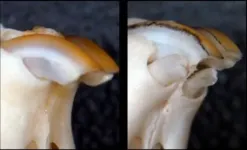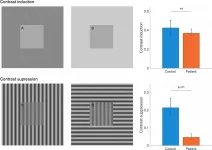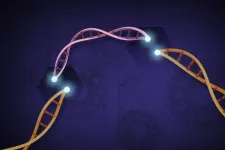(Press-News.org) Japan -- The tooth fairy is a welcome guest for any child who has lost a tooth. Not only will the fairy leave a small gift under the pillow, but the child can be assured of a new tooth in a few months. The same cannot be said of adults who have lost their teeth.
A new study by scientists at Kyoto University and the University of Fukui, however, may offer some hope. The team reports that an antibody for one gene -- uterine sensitization associated gene-1 or USAG-1 -- can stimulate tooth growth in mice suffering from tooth agenesis, a congenital condition. The paper was published in Science Advances.
Although the normal adult mouth has 32 teeth, about 1% of the population has more or fewer due to congenital conditions. Scientists have explored the genetic causes for cases having too many teeth as clues for regenerating teeth in adults.
According to Katsu Takahashi, one of the lead authors of the study and a senior lecturer at the Kyoto University Graduate School of Medicine, the fundamental molecules responsible for tooth development have already been identified.
"The morphogenesis of individual teeth depends on the interactions of several molecules including BMP, or bone morphogenetic protein, and Wnt signaling," says Takahashi.
BMP and Wnt are involved in much more than tooth development. They modulate the growth of multiple organs and tissues well before the human body is even the size of a raisin. Consequently, drugs that directly affect their activity are commonly avoided, since side effects could affect the entire body.
Guessing that targeting the factors that antagonize BMP and Wnt specifically in tooth development could be safer, the team considered the gene USAG-1.
"We knew that suppressing USAG-1 benefits tooth growth. What we did not know was whether it would be enough," adds Takahashi.
The scientists therefore investigated the effects of several monoclonal antibodies for USAG-1. Monoclonal antibodies are commonly used to treat cancers, arthritis, and vaccine development.
USAG-1 interacts with both BMP and Wnt. As a result, several of the antibodies led to poor birth and survival rates of the mice, affirming the importance of both BMP and Wnt on whole body growth. One promising antibody, however, disrupted the interaction of USAG-1 with BMP only.
Experiments with this antibody revealed that BMP signaling is essential for determining the number of teeth in mice. Moreover, a single administration was enough to generate a whole tooth. Subsequent experiments showed the same benefits in ferrets.
"Ferrets are diphyodont animals with similar dental patterns to humans. Our next plan is to test the antibodies on other animals such as pigs and dogs," explains Takahashi.
The study is the first to show the benefits of monoclonal antibodies on tooth regeneration and provides a new therapeutic framework for a clinical problem that can currently only be resolved with implants and other artificial measures.
"Conventional tissue engineering is not suitable for tooth regeneration. Our study shows that cell-free molecular therapy is effective for a wide range of congenital tooth agenesis," concludes Manabu Sugai of the University of Fukui, another author of the study.
INFORMATION:
The paper "Anti-USAG-1 therapy for tooth regeneration through enhanced BMP signaling" appeared 12 February 2021 in the journal Science Advances, with doi: 10.1126/sciadv.abf1798
About Associate Professor Katsu Takahashi from Kyoto University, Japan
Katsu Takahashi is an Associate Professor at Kyoto University Graduate School of Medicine, Department of Oral and Maxillofacial Surgery. His research includes tooth regenerative, oral and maxillofacial development, and maxillofacial malformation, with over 100 publications on the topics. He is also part of numerous prestigious academic organizations, such as the Society for Regenerative Medicine, Stomatology, Dental Research, Jaw Deformity, Oral and Maxillofacial Surgery.
About Professor Manabu Sugai from the University of Fukui, Japan
Sugai Manabu is a Professor in the Division of Molecular Genetics, Faculty of Medical Sciences, University of Fukui. His research interests are in the relationship between cell differentiation and proliferation, with a particular focus on various cells involved in immune reactions. He also covers organogenesis of organs derived from epithelial and mesenchymal interactions, publishing numerous papers on these topics. Sugai is part of numerous academic organizations, including the Japanese Biochemical Society, The Molecular Biology Society of Japan, and the Japanese Society for Immunology.
About Kyoto University
Kyoto University is one of Japan and Asia's premier research institutions, founded in 1897 and responsible for producing numerous Nobel laureates and winners of other prestigious international prizes. A broad curriculum across the arts and sciences at both undergraduate and graduate levels is complemented by numerous research centers, as well as facilities and offices around Japan and the world. For more information please see: http://www.kyoto-u.ac.jp/en"http://www.kyoto-u.ac.jp/en
About the University of Fukui
The University of Fukui is a preeminent research institution with robust undergraduate and graduate schools focusing on education, medical and science, engineering, and global and community studies. The university conducts cutting-edge research and strives to nurture human resources capable of contributing to society on the local, national, and global level. For more information please see: https://www.u-fukui.ac.jp/eng/
A group of researchers from Russia, Germany, the Czech Republic, and Switzerland contest the common belief that resource-based economies have higher levels of within-country inequality than resource-scarce economies. The researchers document a direct causal link between natural resources and within-country inequality and conclude that the extraction of oil and gas can reduce inequality or has no significant effect on it. The results were published in the journal Empirical Economics.
"When we compare the natural resource rents to GDP 10 years after the discovery of natural ...
Researchers specialised in psychiatry and psychology at the University of Helsinki investigated the effects of depression on visual perception. The study confirmed that the processing of visual information is altered in depressed people, a phenomenon most likely linked with the processing of information in the cerebral cortex.
The study was published in the Journal of Psychiatry and Neuroscience.
In the study, the processing of visual information by patients with depression was compared to that of a control group by utilising two visual tests. In the perception tests, the study subjects compared the brightness and contrast of simple patterns.
"What ...
Pedestrian movements are tricky to track, but now the first large-scale statistical analysis of pedestrian flow using anonymous phone data collected in three European capital cities, London, Amsterdam and Stockholm, has been conducted by researchers from KAUST with Swedish colleagues from Gothenburg.
Analyzing the flow of pedestrians through city streets provides insights into how city design influences walking behavior. Studies of pedestrian flow inform new urban developments, enable designers to define quieter areas and "urban buzz" zones and reveal how spaces are used at different times.
"In a previous study, we found strong links between the total ...
The use of artificial intelligence (AI) is becoming more common in many branches of industry and online retailing. Traditional lines of work, such as transport logistics and driving, are developing in a similar direction although mainly out of public view. Scientists at the University of Göttingen have now investigated how efficient the use of AI can be in the commercial management of trucks. Their answer: the best option is an intelligent combination of human decision-making and AI applications. The study was published in the International Journal of Logistics Management.
"As has happened in the private sector, digital applications - as well as machine learning, a kind of AI - are increasingly permeating operations ...
In a new publication from Cardiovascular Innovations and Applications; DOI https://doi.org/10.15212/CVIA.2021.0010, Yidan Wang, Gary Tse and Guoliang Li from The First Affiliated Hospital of Xi'an Jiaotong University, Shaanxi, China and Second Hospital of Tianjin Medical University, Tianjin, China consider how running with face masks or respirators can be detrimental to the respiratory and cardiovascular systems.
The use of face masks and respirators is an important public health measure to reduce or prevent transmission of SARS-CoV-2. Here the authors discuss the hypothetical mechanisms by which exercise with face masks or respirators can induce detrimental effects on the cardiovascular system, potentially explaining adverse events such as cardiac arrhythmias ...
In a new publication from Cardiovascular Innovations and Applications; DOI https://doi.org/10.15212/CVIA.2021.0009, Wenxiu Liu, Yutong Guo, Yue Liu, Jiaxing Sun and Xinhua Yin from The First Affiliated Hospital of Harbin Medical University, Heilongjiang, China consider calcium-sensing receptors of immune cells and diseases.
The authors review current knowledge of the role of CaSR in immune cells. Calcium-sensing receptor (CaSR), which was initially found in the parathyroid gland, is ubiquitously expressed and exerts specific functions in multiple cells, including ...
DALLAS, March 29, 2021 -- As NASA seeks to build a lunar outpost, visit Mars and commercialize spaceflight, the long-term effects of weightlessness on the human heart are of critical importance, according to researchers. By analyzing data from astronaut Scott Kelly's year in space and comparing it to information from extreme long distance, which simulates weightlessness, swimming of Benoît Lecomte, researchers found that low-intensity exercise was not enough to counteract the effects of prolonged weightlessness on the heart, according to new research published today in the American Heart Association's flagship journal Circulation.
Each time a person sits or stands, gravity draws blood into the legs. The work the heart does to keep blood flowing as it counters Earth's gravity ...
DALLAS, March 29, 2021 -- Adults with periodontitis, a severe gum infection, may be significantly more likely to have higher blood pressure compared to individuals who had healthy gums, according to new research published today in Hypertension, an American Heart Association journal.
Previous studies have found an association between hypertension and periodontitis, however, research confirming the details of this association is scarce. Periodontitis is an infection of the gum tissues that hold teeth in place that can lead to progressive inflammation, bone or tooth loss. Prevention and treatment of periodontitis ...
DALLAS, March 29, 2021 -- Six pregnancy-related complications - high blood pressure, gestational diabetes, preterm delivery, small-for-gestational-age delivery, pregnancy loss or placental abruption - increase a woman's risk for developing cardiovascular disease (CVD) later in life, according to a new scientific statement from the American Heart Association, published today in the Association's flagship journal Circulation. The statement calls for vigorous prevention of these risk factors and primary prevention of CVD for women who experience these complications as they transition out of pregnancy and postpartum care into primary care, with continued follow-up to monitor CVD risk throughout life.
About 10% to 15% ...
In a new publication in Nature Communications, associate professor of Plant Science at the University of Maryland Yiping Qi continues to innovate genome editing and engineering in plants, with the ultimate goal of improving the efficiency of food production. His recent work contributes six novel variants of CRISPR-Cas12a that have never before been proven in plants, testing them first in rice as a major global crop. In addition to allowing for a much broader scope of possible gene editing targets, these new tools can edit many different sites in the genome at once, or even repress gene expression to tone down undesirable traits. These patent-pending tools greatly expand the scope of what CRISPR-Cas12a can do in plants, which ...



